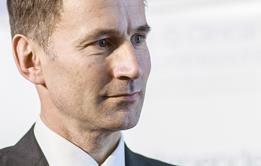If the health secretary is to remain the NHS’s admiral for a few more years he must take on some unpopular causes in a public way - not leave it all up to its captain, Simon Stevens
When Jeremy Hunt’s shrewd sense of self-preservation helped him survive an awkward proximity to Rupert Murdoch during the phone hacking uproar (Rebekah Brooks survived to fight another day too) I thought he was lucky to land such a politically important post as health. He did so in the reshuffle which removed David Cameron’s old boss, the newly ennobled Lord Lansley.
‘Cap’n Simon Stevens actually commands Admiral Hunt’s flagship’
Now that he has remained in place since the 7 May election I’m not so sure. Healthcare in the UK is so much more dynamic and diverse than it was in the days when ministers were supposed to hear every dropped bedpan in Nye Bevan’s local hospital in Tredegar.
It must be both exhilarating and scary to be the admiral on the bridge (Cap’n Simon Stevens actually commands Admiral Hunt’s flagship), but which emotion is uppermost as HMS NHS tries to outrun the storm?
The pace of change is so rapid in so many directions, much of it inspiring, but rising pressures on the service are relentless too.
More from the Hunt interview
Data access is brilliant but vulnerable
I thought a recent edition of The Times inadvertently caught it very well. On one page it cheerfully reported Mr Hunt promising us all access to our GP records on our smart phones within a year, our full hospital records (interacting with individual FitBit data too) by 2018.
Six pages later the paper reported an accidental leak of HIV patient names by an NHS sexual health clinic. Pretty upsetting to the already vulnerable, eh?
As if we didn’t all know, data access is brilliant, but it is also vulnerable, both to hacking and to being “farmed” - remember, if an online service is free it means you may be the product - quite lawfully via cookies.
Only this month charities, a word which makes us all a bit soft headed, had to tighten up procedures to stop the vulnerable being badgered to death (sometimes literally so) by abusers of donor lists.
Great expectations
Alas, there is almost nothing in life that can’t be turned into a racket, including the trail of desperate refugees we never see on TV being fleeced by people smugglers and other hard hearted folk they encounter in Europe. Sooner or later demand outstrips the supply of cash and care, even in Germany and Sweden.
That is not minister Hunt’s problem. Shortages of NHS staff and money are.
The growing shortages of nurses, of full time GPs and some consultant specialities are making a mockery of those safer “24/7 NHS” promises which have caused him so much ill will with the professions whose acquiescence he needs to curb those 11,000 “avoidable” hospital deaths (“15 per cent more likely to die”) among weekend admissions.
My Guardian colleague, Polly Toynbee, recently wrote a vivid account of the pressure on Addenbrooke’s Hospital in prosperous Cambridge, as grand and prestigious a hospital as you could hope to find. After nailing the government for financial cuts, she highlighted in graphic terms the familiar problems of bed blocking, made worse by Thatcher-ish cuts in social care budgets for the elderly frail.
It’s all true. But where liberals sometimes drop the catch in their drive to raise budgets, hire decently paid staff and equip them properly is on the demand side of the equation. Between net immigration and a (related) higher birth rate, the population of the UK has grown by 10 per cent (5 million) since 2001.
‘Hunt must take on some unpopular causes in a public way’
That’s a lot of patients (the newcomers aren’t all GPs or radiographers) and most of them have high expectations of the NHS like everyone else. Germany’s population is falling.
The Tory tabloids complain (rightly in my view) when the non-resident wife of a wealthy Nigerian whose five baby Caesarian cost the NHS (“I’d have paid if they’d billed me,” she says) a six-figure sum. But they also whinge when the cancer drugs fund saves money by axing 25 treatments.
Just as predictable was the outcry over alleged abuses of pioneering personal health budgets unearthed by Pulse magazine, those satnavs, summer house and games consoles purchased on NHS funds. It’s a tricky one, I can see that: White’s “law of rackets” again. But the evidence is that PHBs are part of the cost conscious way forward, both efficient and humane. There are bound to be some trial and error mistakes.
What it requires, if Admiral Hunt (whose dad was a real admiral) is to stay on the bridge for a few more years, improve his reputation among staff and polish his legacy, is that he take on some more unpopular causes in a public way - not leave it all to Cap’n Stevens.
Defending PHBs in choppy water might be one, praising the unorthodox merger plans for NHS purchasers and providers in Newcastle might be another.
And backing Jamie Oliver’s “sugar tax” campaign wouldn’t upset Number 10 as Hunt’s support for fines for no show GP visits did this summer, would it?
Obesity costs avoidable billions and standing up to supermarkets might even be popular, Jeremy - even if it upsets Lord Lansley. But it takes courage.
Michael White writes about politics for The Guardian
Exclusive Hunt interview: CQC ratings have replaced FT status as ‘definition of success’

The mark of quality for an NHS provider is no longer foundation trust status, but the award of a ‘good’ or ‘outstanding’ rating by the Care Quality Commission, the health secretary has said.
- 1
- 2
- 3
- 4
- 5
 Currently
reading
Currently
reading
Michael White: It won't be smooth sailing ahead for Hunt





































6 Readers' comments